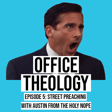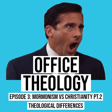Become a Creator today!Start creating today - Share your story with the world!
Start for free
00:00:00
00:00:01

Sermon: Sardis - The Hypocritical Church (Rev 3:1-6)
In this sermon, we unpack the Church of Sardis and how they had the reputation of being alive, but they were actually dead. We learn from Sardis that it is all too easy to slip into hypocrisy and have the appearance of life.
Transcript
Introduction to Sardis and Hypocrisy
00:00:00
Speaker
Hey, thank you so much for tuning into the Office of Theology podcast. I'm excited to share some sermons that I've preached with you. In this sermon we study the Church of Sardis in Revelation chapter 3 and how easy it is to slide into hypocrisy.
00:00:15
Speaker
And I am so excited to, as we continue in our Revelation series, until he comes. We're gonna be kicking off chapter three, which is studying the Church of Sardis, the Church of Sardis. And so I'm excited for this because I've titled today's sermon, Sardis Church, The Hypocritical Church. So it's just a really light topic, we'll all be fine, cool?
00:00:41
Speaker
But what I wanna do is over this time, I want to study this guiding thought, kinda help us frame where we're going. When we forget the gospel on a personal level, we can drift into hypocrisy. When we forget the gospel, not in knowledge, but on a personal level, we can drift into hypocrisy.
00:01:08
Speaker
So with that thought, let's pray. Jesus, we love you. God, today is not about us. It's not about true hope. It's about you, Jesus. God, would you reveal in our hearts today, may we have a humble attitude to focus on you and to hear your word and to hear your correction and to hear your conviction and respond well to it, Jesus.
00:01:36
Speaker
God, we thank you for the opportunity. We say, come Holy Spirit, have your way. This is because of you, this is for you, and this is by you. We say this in your wonderful name. Amen.
Historical Context of Sardis
00:01:48
Speaker
So let's give a little context to who is Sardis. Like, where is it at? I know every time we do this, like, Brennan, I want to know where Sardis is. It's in modern-day Turkey. That's where it's at. Now you know. It was a busy commercial industrial town that had lots of luxury and lots of wealth. So the setting is crucial for this church.
00:02:09
Speaker
The main temple or the pagan god in Sardis was a goddess called Sybil. Sybil was considered the great mother of the gods and was associated with motherhood, nature, fertility, and agriculture.
00:02:21
Speaker
See Sardis, the actual town, the city was considered to be impregnable against enemy forces because the city was built up against this hill. So it's like this massive mountain and then the city's built against it and so they figured all we gotta do is protect the front because no one's crazy enough to come down the backside of this mountain. The funny thing is though, it's fallen twice due to its lack of vigilance.
00:02:52
Speaker
Fun fact is, when they positioned soldiers to defend the city of Sardis, they never placed any on the side that was against the hill. For they assumed because it was against the hill, there would be no attack on that side. And that's where and how they were conquered. They had the appearance of strength, but they let their guard down, which led to their conquering.
00:03:18
Speaker
Now with that in mind, let's read Jesus's words to Sardis.
Jesus' Message to Sardis
00:03:23
Speaker
It says this in Revelation chapter three, verse one. And the angel of Sardis in church, the angel of the church in Sardis write, the words of him who have the seven spirits of God and the seven stars. I know your works and you have the reputation of being alive, but you are dead. What a way to start a letter.
00:03:48
Speaker
Wake up and strengthen what remains and is about to die, for have not found your works complete in the sight of my God. Remember then what you received and heard, keep it and repent. If you will not wake up, I will come like a thief, and you will not know what hour I will come against you, yet
00:04:14
Speaker
You still have a few names in Sardis, people that have not soiled their garments. That's a very intense picture, but he's trying to draw a point of what's going on. And they will walk with me in white, for they are worthy. The one who conquers will be clothed thus in garments, white garments.
00:04:36
Speaker
And I will not blot his name out of the book of life. I will confess his name before my father and before his angels. He who has an ear, let him hear what the Spirit says to the churches." So that's pretty intense, right? I see what you're doing. I see the works you have. You have a very good reputation for being alive. But in fact, what you see is not the reality. You are actually dead.
00:05:06
Speaker
I don't know about you, but I begs this question for me, what condition was the church of Sardis in to need this sort of confrontation? But if we can make it a little more personal, perhaps some of us in this room this morning or listening online would say this, where in our life do you need this sort of confrontation?
Outward Appearance vs. True Character
00:05:29
Speaker
Constantly, Jesus comes and he says, I have this against you. And a common theme throughout this book of Revelation and the church so far is, is there room in our relationship with the Lord that he can say to us, I see all this area where you've grown, but I still have this against you. And that statement, I still have this against you is the most loving thing the Lord, what Jesus can do for us.
00:05:59
Speaker
And so from here, I have three main observations I'd like to unpack from this text. The first is this, people's perception are not the proof of genuine faith. People's perception of you and your faith is not proof that you have genuine faith, or the perception you have of others.
00:06:22
Speaker
Man, their faith is so genuine, how do you know? Well, look at what they do. Now, we're gonna get into this. What we do is very important as well, so don't get lost on that. But this is coming from the second part of verse one, where Jesus says, I know your works, I know you have the reputation of being alive, but you are dead. As Jesus said to each church, he also said to Sardis.
00:06:47
Speaker
What a church is and what a church does is never hidden from Jesus. Let's make it a little more personal. Who we are and what we do is never hidden from Jesus. That no matter what I try to show outwardly, it is never hidden from the sight of God.
00:07:10
Speaker
Now that can either do one of two things. That can intimidate me and make me nervous or it can be relieving because he sees that depth of me and he still chooses to love me. If you looked at the church of Sardis, you'd see signs of life in the church of Sardis like the city of Sardis. Everything seemed alive and good.
00:07:37
Speaker
But this sounds awfully familiar from Jesus. This isn't the first time that Jesus has rebuked someone for outward appearance versus internal reality.
00:07:50
Speaker
Jesus says rebuke of the Pharisees and the scribes in Matthew chapter 23 reads this. He's given this long rebuke, scathing rebuke, well needed. And this is what it says in chapter 23 verse 27 through 28. Woe to you scribes and Pharisees, hypocrites.
00:08:08
Speaker
For you're like whitewashed tombs, which outwardly appear beautiful, but within are full of dead people's bones and all uncleanliness. So you also outwardly appear righteous to others, but within you are full of hypocrisy and lawlessness. Whew! That's intense. And what I love about this is the consistency in Jesus' message of hypocrisy.
00:08:37
Speaker
So it's the same Jesus in Revelation 3 as it is in Matthew 23, that he has something against when we appear and we work on our reputation outwards, but inwardly nothing's changing. And so I want to talk about what Jesus has against them.
00:08:57
Speaker
Despite the reputation of life, Jesus saw them for what they really were. They're dead, right? He says, but you are dead. Shows this, that a good reputation is no guarantee of true spiritual character. That a good reputation is no guarantee of true spiritual character. Despite their good appearance, Jesus saw them as dead. Isn't that interesting?
00:09:26
Speaker
Something interesting about the word dead is this. It indicates no struggle, no fight, no persecution. It wasn't that the church of Sardis was losing the battle. A dead body has already lost the battle. The fight seems over. In this letter, Jesus didn't encourage the Christians in Sardis to stay strong against persecution or false doctrine, but exposed them for their true spiritual state and now was dead.
The Illusion of Inoffensive Christianity
00:09:57
Speaker
There's this quote by George Ladd and it says this, Sardis is a picture of a nominal Christianity. Outwardly prosperous, but with the externals, busy with the externals of religious activity, but devoid of spiritual life and power. Sardis is a perfect model of an inoffensive Christianity. The problem was not scandalous wickedness, but a decent death.
00:10:26
Speaker
Their image, an outward appearance, said alive, but in substance there was nothing. Came out hot this morning.
00:10:37
Speaker
But what I love about this message and what I love about this letter to the Church of Sardis is this could be the most, most awakening moment in our life if we allow the word of God to do what it does best, to convict and transform and bring correction and to bring life. Because I don't know about you, but a life that looks like a good Christian life but is void of the spirit I work with in my life is a miserable tension to be in.
00:11:06
Speaker
I'm doing all the right things, but yet the Spirit of God is not actively working in my life and in my heart and my innermost being. The problem is it can become very easy to mimic the right Christian spiritual things and completely miss the relational peace and the Spirit of God at work within us. See, we're not meant to just mimic the right things. We're meant to be transformed from the inside out.
00:11:42
Speaker
But this causes
Why Focus on Reputation?
00:11:43
Speaker
me to ask this question. What causes us to focus on our reputation rather than our substance? You thought about this? The very first thing as I was praying through this and working through it was this is approval. We are consumed by people's approval. We do the right things
00:12:10
Speaker
for the sake of other people's approval and opinion of what we're doing. That our entire
00:12:19
Speaker
reputation is consumed by what does this person think of me and what do I think, what would they approve of in my life? How do I give the appearance to this individual or people that I am in a good spot? How do I increase my reputation? And in that pursuit, what happens is what guides our works is the approval of man, not the approval of God.
00:12:47
Speaker
So it's very easy to fall into the spot where we focus on our reputation because of approval and we don't work on our substance. And if you work on the substance, the innermost being of your life, if you spend that time with the Lord allowed him to transform you from the inside out, you won't need to tell people. If you feel like you have to tell people you're spiritual,
00:13:21
Speaker
The second piece is this. What causes us to focus on a reputation rather than our substance is this, avoidance. If I had to mark one for myself, it's this one. Afraid of being honest about the condition of your heart. We think if I can just keep doing the right things, eventually,
00:13:50
Speaker
the right feelings will follow. We convinced ourselves that if I just do the right things, the right actions over and over and over without addressing the deep spiritual bankruptness in my heart, then eventually my actions will produce life and vitality deep within. This is an unwillingness to deal with what's going on deep down.
00:14:15
Speaker
I'll just cover it up. I'll just avoid the issues that I have in my heart. I'll avoid the issues in my life. I'll avoid the tensions. I'll avoid the marital brokenness in my life. I'll avoid the deep sin that I refuse to confess. I will just avoid all of this. And hopefully, if I just keep doing the right things and not deal with the wrong things, that it'll produce this substance that I so long, that I want so bad.
00:14:40
Speaker
It's like spraying in your ankle and being injured and pretending like you don't have a sprained ankle and you walk on it just to make things worse. Avoid it. The third piece of this is apathy. You know, sometimes it just seems easier to put on a mask or a facade than to cultivate our relationship with Jesus.
00:15:05
Speaker
What I've learned of being a Christian for 17 years now is that it's sometimes easier because now I know the language. Now I know the movements. Now I know the words to say, the prayers to do. I know all the worship songs. I don't have to look at the screen. Like I know all these different things and I no longer have to do the work of cultivating the relationship with Jesus in my heart.
00:15:34
Speaker
The city of Sardis was full of luxury, full of wealth. It was easy. When the environment we live in is comfortable and easy, it's far easier to ride the wave of someone else's relationship with Jesus. So as good as environments like this are,
00:16:05
Speaker
We can come into environments like this and be like, man, I hope they play some amazing songs today because I'm just not feeling it. Or I hope they play my favorite song, right? Man, I hope that Ryan just comes full of fire today. I hope he gets really passionate and claps at me. I love that. Or I hope Brennan cries today because I really need someone to provoke that emotion within me. We'll check, OK?
00:16:33
Speaker
So what ends up happening is we mimic these good outward expressions without the deep work of getting there ourselves. It's so easy to mimic. It's a different thing to do the work to be transformed ourselves. Because if all we do
00:16:56
Speaker
is mimic without ever doing the work of growing personally and internally. All we will do is have a reputation for being alive, but actually we'll be dead.
Strengthening What Remains
00:17:11
Speaker
See, this rebuke from Jesus is immediately followed by hope as he always does. He addresses the condition of the church of Sardis and us, but then invites us to the remedy of his assessment.
00:17:26
Speaker
And it's this, point two of main observations. Strengthen what remains. Wake up and strengthen what remains and is about to die. For I found your works not complete in the sight of my God. Jesus' first words wake up our hope to this artist's church. It means that in this state they have found themselves, they still can be woken up.
00:17:51
Speaker
Because what question this brings up to me, what causes a church and or us to be in need of being woken up? As I mentioned earlier in Sardis' history, it was conquered twice. It wasn't that the attacking armies overwhelmed them, but it was the overconfidence that has caused them to stop being watchful.
00:18:11
Speaker
When we stop being watchful at the state of our faith, it will inevitably slide into slumber, compromising hypocrisy. When we stop being watchful over the state of our faith, it is inevitably gonna slide somewhere, and it's never towards holiness. Bummer, right? I don't just neglect my faith and my relationship with Jesus and just become more godly. It doesn't work that way.
00:18:40
Speaker
So the demise of Sardis is that they stopped being watchful. But the fact that Jesus tells them to strengthen what remains shows them that the spiritual condition of Sardis was bad, but it wasn't hopeless. And if you find yourself in here this morning or listening online in a bad spot,
00:19:05
Speaker
This should be encouraging to you because no matter the spot you find yourself in, you are not hopeless. That the gospel is strong enough that Jesus' death, burial, and resurrection is more powerful than anything you walked in here with. So it is not hopeless. Man, spiritually, there were things which remained that could be strengthened.
00:19:34
Speaker
But this is what he says. If these things were not received by the correction Jesus is bringing, Jesus said it is about to die. This is a warning light on their dash from Jesus saying, hey, you're going the wrong way.
00:19:55
Speaker
Later on in the text it says, for I've not found your works complete in the sight of my God. This shows us that their works, though present, had not measured up to God's standards. The presence of works isn't enough because God requires a specific intent and purpose in all of our works.
00:20:19
Speaker
They should be done with a heart in a manner that is complete in the sign of God. We talked about it with Ephesus, come back to the first love. That's why we do these things. Works born out of a love for God is complete in his sight. Now this isn't an anti-work sermon, so don't try to get out of that. It's works that overflow from a transformed heart. Like I love my wife, therefore I do things to serve her. I don't do things for her to try to love her.
00:20:49
Speaker
And so what's interesting is that they had works, but no intimacy. This also sounds familiar from Jesus. Again, in Matthew chapter seven says, not everyone who says to me, Lord, Lord will enter the kingdom of heaven.
00:21:04
Speaker
But the one who does the will of my Father, who is in heaven, on that day many will say to me, Lord, Lord, do we not prophesy in your name, cast out demons in your name, and do mighty works in your name, and then will I declare to them, I will declare to them, I never knew you, depart from me, workers of lawlessness. Jesus doesn't leave any room for this. And I love that about Jesus.
00:21:35
Speaker
We love the gray, don't we? I'm not really sure what to do with this. It's kind of gray because gray means we don't have to do anything. Well, it's nuanced, you see. Is it, though? If Jesus was simply after our works and not our hearts, there would be no discussion with this artist's church right now. There would be no need for it.
Overcoming Hypocrisy with Remembrance
00:22:01
Speaker
Okay, so if we are to strengthen what remains, you probably have a really good question on your mind. How do we do that? Thank you for asking. It's this. Remembrance and repentance are the way out of hypocrisy. In verse 3 it says, remember then what you received and heard, keep it and repent.
00:22:24
Speaker
George Latta also says this, John recognized the church, recalls the church to its earliest experience of love and devotion to Christ. He recognized that there remained a faithful element in the church and he called upon the church as a whole to remember the early days of when they received the gospel to hold fast to their devotion and to repent of the indifference in which they have fallen. So for us,
00:22:51
Speaker
Remember the gospel that you have received and that you have heard. Pause for just a moment. I know it's easy like we're in the Sunday flow of everything. There's a sermon going on. There's different things. There's different elements going on. Life is going, but just stop for a second. Remember when you were impacted by the gospel for the first time.
00:23:24
Speaker
For me, I'll give you a very brief snapshot. I was towards the end of my senior year in high school. I got it. Give me a second. I came from a pretty broken divorced home with this severe
00:23:54
Speaker
with the parentatas of your alcohol addiction. All, I can remember it clearly, all I can remember is that my home life and just everything felt so upheaved and just there's no stability, there's no love, there's no peace. I just wanted that. It's a fair request, right?
00:24:26
Speaker
So what I ended up doing, isn't that pursuit of love and peace? I found myself chasing anything that the world promised would deliver on those. Right? Relationships will make you feel love. Right? Chasing more money. Finding more friends. I scraped and clawed at things that I thought would give me the love and peace that I was looking for.
00:24:57
Speaker
But what happened is, I ended up being far more broken and lonely than my initial pursuit. The things I promised, loved, and peace, did nothing then take those from me. Then I heard the gospel. For the very first time. And it's not like I heard someone was yelling at me at the gospel or someone sitting with me and explaining the gospel.
00:25:28
Speaker
and explaining that the depth and the loneliness and the brokenness that I'm searching for to the remedy is not found in all of those things I was trying. In that moment, I didn't just hear the gospel. I felt it reign over the brokenness in my life. It was such an overwhelming feeling.
00:25:56
Speaker
It was such a memorable moment because the searching had stopped, right? The joy and the peace that I've been longing for, that I've been in pursuit of in every which way the promise that it would deliver has stopped because it has been found and it has been found in Jesus. You see, the gospel is not elementary Christianity, it's the foundation of our faith.
Personal Impact of the Gospel
00:26:25
Speaker
It's a moment when the weight of Jesus' life, death, and resurrection became real, not just in knowledge, but in heart level. Who I was, the good and the bad, did not even stand in comparison to who He is. You see, the world gospel is that you are the center of your world. The biblical gospel is that Jesus is the center and I come under that.
00:26:50
Speaker
And so when I realized, man, I've been in pursuit of my joy and my peace and my happiness, I submitted that under to Jesus and all of a sudden the things that I was hoping for paled in comparison to what I got with Jesus. My shame, my guilt, achievements, pride, apathy, brokenness, heartache, all of it is placed at the feet of Jesus and what a sweet place that is to be.
00:27:18
Speaker
The freedom that comes from hearing and experiencing the gospel is the freedom that we all are longing for still today. With that in mind, we must do what Jesus said to the church of Sardis and us today, and we must keep that. How easy is it as our faith goes along that we forget the sweetness of the gospel when we were impacted for the first time? Sardis has forgot that.
00:27:48
Speaker
And so when they forgot the personal gospel, they drifted into hypocrisy. What it means to keep it, another word for keep are retain, preserve, possess, maintain and save. Keep the gospel close to you. And mind and practice and word in all of you do, in all that you do. Don't let it drift from you. Like I said earlier, it is so easy
00:28:19
Speaker
If I don't keep my faith, if I don't guard it, if I don't protect it, if I don't hang on to it with every part of my being, I will drift away from it because the sin that still dwells within me does not like that because the sin within me wants to be the ruler of my own life. And so it's an active keeping. You must keep the gospel.
00:28:42
Speaker
And it's from this place of remembrance and keeping it that he invites us into the next step. He lays it out for us in verse three is repentance. Repent of straying away from the gospel and return to the gospel. Repentance is not this one time thing. It's a daily continual thing. Well, I repented of that before. Odds are you probably have to repent about it again. Me? Am I the only one that feels like that?
00:29:10
Speaker
Well, I already, you know, I repented once, okay. Well, you're only about, however much life is left, that's how much more you got to go. Repentance is a two-part process, acknowledging first that you've strayed away from Jesus, his words and his ways. This is gonna be the little sidebar, and I have time for it, so let's do it. It's so easy to make the Christian life and our faith about conviction.
00:29:39
Speaker
But conviction is the indicator, the warning light on the dashboard that something is wrong in your life. Sometimes you make conviction an idol. I just feel convicted by this. Well, what did you do with that conviction? Conviction is the grace of God tapping you on the shoulder. It is the crushing blow to what you have put your security in outside of him. Conviction is your reminder to return.
00:30:08
Speaker
And a lot of the time, man, just, man, how's the message? Oh, I was so convicted by it. I'm guilty of saying that. Oh, just so, oh, that song was so good, just so convicted. I read my scripture, I'm so convicted. Yes, yes, yes, conviction is the first part of repentance. It's the reminder that, hey, your life is out of alignment of what you are hearing and what you're hearing is the word of God and word of God is calling you back. So when you're convicted, don't stop there, like, ooh.
00:30:37
Speaker
That was a holy hurt. That was a holy burn. Yes, Jesus, that was good. But no, what does that conviction lead to? You want to experience the fullness that Jesus has? Allow that conviction to lead to transformation. Allow that conviction to lead to humility, to sacrifice, to a devotion,
00:31:06
Speaker
to Jesus. The second part of repentance is this is returning back to Jesus, his word, and his ways. There's an active switch in your mind, behavior, desires, and actions. When we return back to Jesus,
00:31:32
Speaker
It's not just a acknowledgement I need to return back. It's an act of return. It's that the things that I have been doing out of line of His Word and His ways and His will, I'm gonna stop doing those things. I'm gonna return back and start doing the things He's called me to. That is no longer what we're doing.
00:31:59
Speaker
but why we're doing it. Because if the church of Sardis has taught us something, it's that we can do the right things but miss the reason why we do them. Now we can come in environments like this and do all the right things but completely miss the heart level why we do it. Why do we sing at the beginning? Because it's not about us. We're taking time to get the focus off of ourself for a moment and onto the one who deserves our attention. We're worshiping Him.
00:32:30
Speaker
Why do we go through and exegete scripture to remind us that this isn't actually about us. It applies to us, but it's not about us. It's for us, but it's not written to me. I benefit greatly from the word of God, but it's about him. I have some questions I want to ask and for us to think about and reflect upon. The first is this. How have you forgotten the gospel for yourself?
00:33:03
Speaker
How have you forgotten the gospel for yourself?
Invitation to Embrace the Gospel
00:33:07
Speaker
Have you become so used to the water that you swim in that the gospel has lost its weight with you? This is me. I feel like the longer I am a Christian, the less grace I have for myself. And secondly, the gospel becomes familiar.
00:33:31
Speaker
and not familiar in a good way, familiar as in, oh, I'm used to that, oh yeah, I know it. But what happens is I can become so familiar and know the gospel that it no longer transforms the way that I think, the way that I do life, doesn't transform my opinions, doesn't change how I parent, doesn't change how I'm a husband. How have you forgotten the gospel for yourself?
00:34:02
Speaker
Where do you feel like the Lord's trying to remind you deep down saying, hey, this area that you're holding onto, this area that you are so full of maybe shame about or guilt about, you say, no, my gospel covers that too. Second question is this, or I guess within this real quick.
00:34:30
Speaker
I don't wanna move too fast to the second question. Let's go back to the first one. I don't wanna make any assumptions that just because you're in this room this morning or watching online is that you've said yes to the gospel at all. This is sneaky because maybe you've been around the gospel a lot but have never fully committed to the gospel.
00:34:57
Speaker
because it's easy to come in environments like this and hear the gospel, yeah, the gospel, yeah, it's good, good, good. But you've never stopped saying, yes, Jesus, I want to respond to the gospel for myself and not just what I hear. Maybe you've heard it, but you have yet to trust it. Maybe you've heard it, but you have yet to respond to it and give your life and say, Jesus, you can not only be my savior, but you can also be my Lord. I wanna invite you to that.
00:35:28
Speaker
that the peace and the joy and the longing you are looking for is not found in the cheap imitation and knockoffs that the world sell us as peace, joy, and love. But it's found in the gospel of Jesus. The second question I have for you is this. Where has your life drifted into hypocrisy?
00:35:56
Speaker
It's probably not a question I ask myself very often, if I'm honest with you. But that's why I love scripture. I would have never asked myself this question unless I was confronted with it. What things do you do just because they have the appearance of being right?
Self-examination and Spiritual Drift
00:36:14
Speaker
Now I'm not saying, well, I gotta stop reading scripture. That's not what I'm saying. I'm saying examine, examine the why of the what you're doing.
00:36:27
Speaker
And this is the invitation from Jesus himself in verse six. He who has ear, let him hear what the Spirit says to the churches. The invitation for the Sardis Church is the same for us today.
00:36:46
Speaker
Do we have an ear to hear where the Lord is speaking to us? Do we have an ear to hear the conviction from the Spirit of God in our life today? And do we have the ear to not only hear the conviction, respond to it, and now walk into that conviction that leads to life transformation?
00:37:06
Speaker
because what a gift it is to be confronted by the Spirit of God. What a gift it is for Jesus to say to you and to me, I see all that you do, but I still have this against you. And he's not trying to nitpick you apart for the sake of tearing you down. He's saying, the thing that I'm trying to point at is actually taking you out and it's costing you more than you realize. So let's work on that. Let's grow through that. But most importantly, let me help you through that.
00:37:39
Speaker
So that's the invitation today.
00:37:44
Speaker
And I'll remind you of the guiding thought at the very beginning. When we forget the gospel on a personal level, we can drift into hypocrisy.
Conclusion and Prayer
00:37:52
Speaker
So let's pray. Jesus, we love you. Thank you for your word. Thank you for the gift that it is. Thank you for your Holy Spirit. That brings conviction. That brings hope. That brings peace. God, may we continue to focus on you in your word, in your goodness,
00:38:14
Speaker
that no matter where we find ourselves, we are not too far gone, we are not hopeless, but there's hope found in you and your finished work on the cross. So I thank you for your grace, thank you for your hope, thank you for your love. Amen.


















